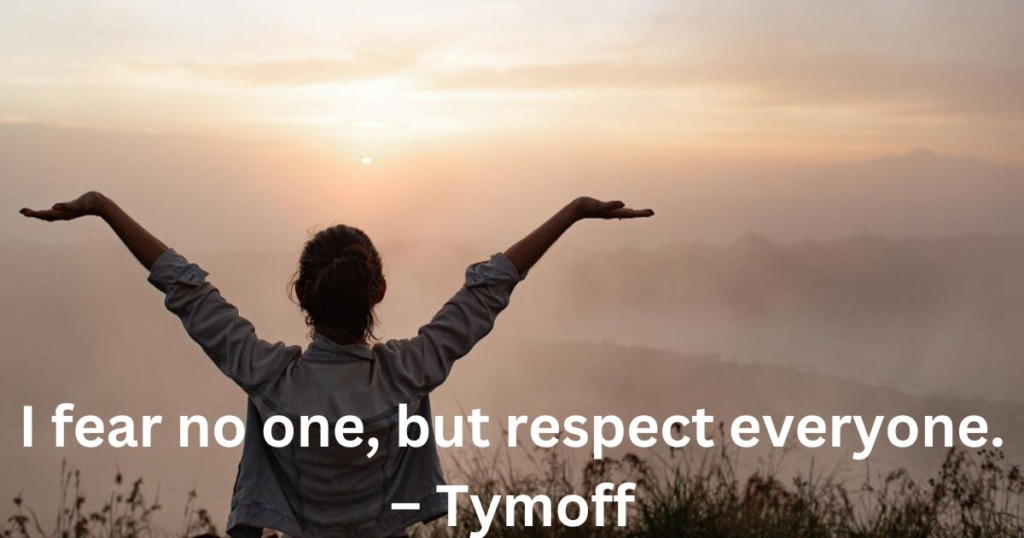Tymoff’s statement, “I fear no one, but respect everyone. – tymoff” pres” is a refreshing perspective in a world where “respect and fear often intertwine. This declaration is a bold assertion of self-confidence and a profound commitment to mutual respect. It challenges us to consider the balance between maintaining personal integrity and recognizing the worth of others. To fully appreciate the depth of Tymoff’s wisdom, it is essential to dissect the components of this statement and explore its implications in various facets of life, including personal growth, professional interactions, and societal dynamics.
The Essence of Fearlessness
Fear is a fundamental human emotion, often serving as a survival mechanism. However, it can also be a limiting force, preventing individuals from reaching their full potential.TTymoff’s assertion, ” Fear no one” suggests a state of being free from the constraints imposed by fear. This fearlessness is not about recklessness or a lack of caution; instead, it is about an unshakeable inner strength that allows one to face challenges and adversities without fear.
This kind of fearlessness is deeply rooted in self-confidence and self-awareness. It requires an understanding ofone’ss own values, strengths, and weaknesses. When individuals are confident in who they are, they are less likely to be intimidated by others. This fearlessness allows for a more authentic and assertive approach to life, where one can pursue goals and dreams without fear of judgment or failure.

The Power of Respect
On the other side of the spectrum lies respect. Respect recognizes the inherent worth and dignity of every individual. It acknowledges that every person has value, regardless of background, beliefs, or actions. Tymoff’ss statement”” but respect everyone”” underscores the importance of maintaining this recognition in all interactions.
Respect is a fundamental building block of healthy relationships and functional societies. It fosters an environment where individuals feel valued and heard, leading to more productive and harmonious interactions. In professional settings, respect can enhance teamwork, collaboration, and innovation. In personal relationships, it can deepen connections and mutual understanding. By advocating for respect, Tymoff emphasizes honouring others while remaining true to oneself.
Balancing Fearlessness and Respect
The natural beauty of a statement is that it strikes between fearlessness and respect. While fearlessness allows for personal empowerment and self-assertion, respect ensures that this empowerment does not come at the expense of others. This balance is crucial in maintaining integrity and ethical behaviour in all aspects of life.
In the professional realm, this balance can manifest in leadership styles. Fearless leaders who respect their teams are often the most effective. They are confident in their decisions and vision but open to feedback and diverse perspectives. This combination of traits fosters a culture of trust and mutual respect, leading to better outcomes for the organization.
In personal relationships, balancing fearlessness and respect means being true to oneself while honouring the feelings and boundaries of others. It involves assertive communication, where one can expressone’ss needs and desires without undermining the otherperson’ss sutures and have a more fulfilling relationship.
Overcoming Societal Norms
Societal norms often dictate how individuals should interact, blending fear and respect in ways that can be confusing and sometimes harmful. For instance, certain cultures might instil fear towards authority figures, conflating respect withssubmissisubmissionTymoff’sionn ThesennoTymoff’stheseatingaa clear boundary: fear is unnecessary, but respect is paramount.
By separating fear from respect, individuals can engage with others more authentically. This approach encourages questioning and critical thinking, essential for personal and societal progress. It promotes a culture where ideas and actions are judged based on merit rather than the authority or power of the individual presenting them. This shift can lead to more equitable and just societies where respect is earned and not demanded through fear.
Practical Applications in Daily Life
ApplyingTymoff’ss life involves conscious effort and practice. It starts with self-reflection and self-awareness. Understandingone’ss fears and insecurities is the first step towards overcoming them. This can be achieved through mindfulness, journaling, or seeking therapy. Building self-confidence is a gradual process that involves setting and achieving personal goals, celebrating successes, and learning from failures.
Respecting others begins with empathy and active listening. It involves putting oneself in another shoes, and another perspective should be practised in everyday interactions at work, home, or social settings. Simple acts such as acknowledgement with kindness and courtesy go a long way in building a respectful environment.
In leadership, applying this balance means creating a culture where fear is not used as a tool for control. Instead, leaders should inspire and motivate through respect and trust. This involves transparent communication, recognizing and rewarding contributions, and providing support and resources for personal and professional growth.
The Impact on Personal Growth
Embracing the philosophy of fear, no one but respec”” and””everyon”” can profoundly impact growth. Fearlessness encourages individuals to step out of their comfort zones, take risks, and explore new opportunities. It fosters resilience as individuals learn to navigate failures and setbacks without being deterred by fear. This resilience is crucial for personal development and achieving long-term goals.
On the other hand, respect is a person’s growth, broadening,broadening’ss”rasp broadening” diverse experiences, and building of meaningful connections. Respectful interactions can lead to greater self-awareness and emotional intelligence, critical components of personal growth.

Challenges and Limitations
Tymoff’s statement, whilePa’ss powerful frame statement, does not sayTymoff’ssson’ss personal conduct is without challenges. Overcoming deeply ingrained fears requires time, effort, and, often, external support—similarly, practising respect consistently, especially when encountering adversity.
Additionally, there can be a fine line between fearlessness and arrogance. It is essential to ensure that fearlessness does not translate into a disregard for others’ footers by using true fearlessness and respect.
Conclusion
Tymoff’s statement fears no one but respects Eve. Tymoff’ss first pr”” one and balanced approach to lif”” advocates for self-confidence and inner strength while emphasizing the importance of mutual respect. This philosophy can lead to personal empowerment, healthier relationships, and more equitable societies. By overcoming fear and practising respect, individuals can navigate challenges and build a more harmonious world.
Also, Read The Following: love what you have before life teaches you to love – Tymoff.








